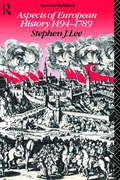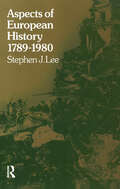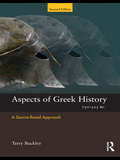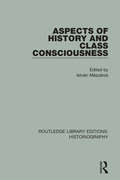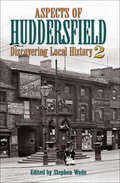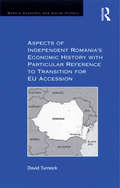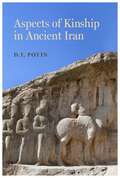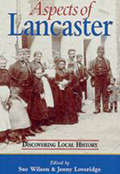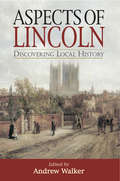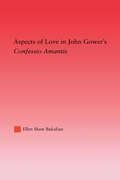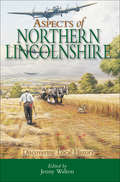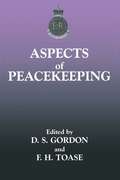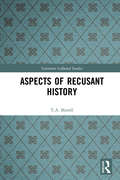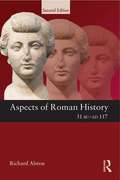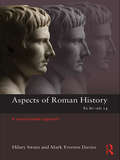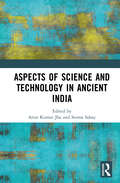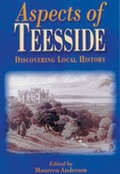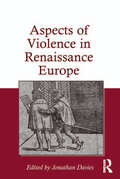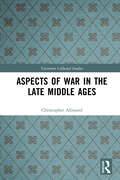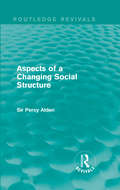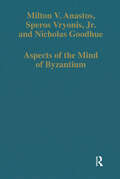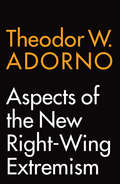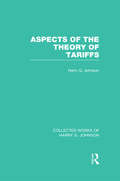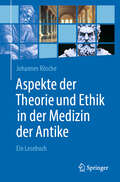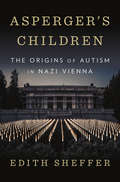- Table View
- List View
Aspects of European History 1494-1789
by Stephen J. LeeFirst published in 1984. Routledge is an imprint of Taylor & Francis, an informa company.
Aspects of European History 1789-1980
by Stephen J. LeeIn this sequel to his popular Aspects of European History, 1494 - 1789, Stephen J. Lee charts the most commonly encountered topics of nineteenth and twentieth century history, from the origins of the French Revolution, through the social and political reforms and upheavals of the last two centuries to the present. Helpful and accessible, the book includes: * an invigorating guide and sound source of background material * short analytical chapters* an interpretative approach to history, providing a range of viewpoints on each subject* both a broad survey and specific studies* stimulation for student's ability to develop and clarify theme* a careful structure which aids notetaking, preparation of essays and revision. Any student of European history will want to have this book at their side throughout their course studies.
Aspects of Greek History 750–323BC: A Source-Based Approach
by Terry BuckleyAspects of Greek History 750- 323 BC: A Source-Based Approach offers an indispensable introduction to the central period of Greek History for all students of classics, from pre-university to undergraduate level. Chapter by chapter, the relevant historical periods from the age of colonization to Alexander the Great are reconstructed. Emphasis is laid on the interpretation of the available sources, and the book sets out to give a clear treatment of all the major problems within a chronological framework. This new edition brings the book up-to-date with the latest scholarship and includes a more detailed study of Sparta, Delian League, and the Athenian Empire, expands the range of sources examined, and offers an extended discussion of the growth of Athenian Imperialism towards Samos, Mytilene and Melos. It includes: a critical discussion of the lives, works, usefulness and reliability of the main literary sources: Thucydides, Herodotus, Xenophon, Plutarch, Diodorus, and Aristotle numerous quotations and references from these and other sources, including inscriptional and archaeological evidence, accompanied by a critical analysis of their worth maps, a glossary of Greek terms, and a full chapter-based bibliography. Aspects of Greek History is an invaluable aid to note-taking, essay preparation and examination revision.
Aspects of History and Class Consciousness (Routledge Library Editions: Historiography)
by Istvan MeszarosThe various contributions in this book, originally published in 1971, discuss many aspects of the complex subject of history and class consciousness, and the themes that are dealt with are all inter-related. The papers range from history and sociology, through political theory and philosophy, to art criticism and literary criticism. Georg Lukács’ classic work History and Class Consciousness, is discussed in several of the essays, and the volume is prefaced by a letter from Georg Lukács to István Mészáros.
Aspects of Huddersfield 2: Discovering Local History 2
by Stephen Wade"Aspects of Huddersfield, the first in the highly successful Aspects series to feature Huddersfield and district, contains a wealth of pinpoint detail of the history of the town. The story of the coming of the ""wireless"" to Moorside Edge, which made Huddersfield the radio centre for Northern England, sits alongside the proceedings of the Manorial Court at the Manor of Honley in the 18th and 19th centuries. A fascinating collection of the Legends of the Colne Valley, sits easily with Early Days in the Mill and the Diary of an Unknown. A tale of courtship in the mid 1920s. While the Chartists went ""The Whole Hog"" in Huddersfield, Mrs Sunderland became the ""Yorkshire Queen of Song"", a feat still recognised in an annual music festival in her name. Aspects of Huddersfield cannot but enthrall both the dedicated researcher and the general reader with an interest in the town and its environs."
Aspects of Independent Romania's Economic History with Particular Reference to Transition for EU Accession (Modern Economic and Social History)
by David TurnockAfter fifteen years of transition in the former communist states of Central and Eastern Europe it has become clear that for a substantial number the objective of reform and restructuring process is a market system in line with membership of the EU. In this study the long term economic transformation of Romania is studied, offering a detailed narrative and thematic account of events from the nineteenth to the twenty-first centuries. From the first steps towards large scale industrialisation begun prior to the First World War, through the accelerated pace set by the communist regime after 1945 and the uncertainty following its subsequent collapse in 1989, the book addresses a wide range of pertinent issues that have shaped Romania's economic development. The study also offers an interpretation of a distinctive phase in the modernisation of post-communist Romania, supported by economic-historical surveys of the proceeding century as a context for recent restructuring on the eve of EU accession. This is linked with trends in the region as a whole so that a broad perspective is maintained throughout the book. By highlighting Romania's position as one of more backward accession states and considering in what ways its experience during transition differs from the more developed states of the region, this study offers a valuable insight into both the history of Romania, and its future prospects. Furthermore it provides a valuable case study that can be compared and contrasted with other countries who are likewise still grappling with the legacy of a centralised economy, and in the process of adopting a more market orientated approach in order to gain EU membership. As such this study will be of interest not only to historians and economists, but anyone with an interest in the expansion of the European Union.
Aspects of Kinship in Ancient Iran (Iran and the Ancient World #1)
by D. T. PottsA free ebook version of this title is available through Luminos, University of California Press’s Open Access publishing program. Visit www.luminosoa.org to learn more. Originally delivered as the Biennial Ehsan Yarshater Lectures, Aspects of Kinship in Ancient Iran is an exploration of kinship in the archaeological and historical record of Iran’s most ancient civilizations. D.T. Potts brings together history, archaeology, and social anthropology to provide an overview of what we can know about the kith and kinship ties in Iran, from prehistory to Elamite, Achaemenid, and Sasanian times. In so doing, he sheds light on the rich body of evidence that exists for kin relations in Iran, a topic that has too often been ignored in the study of the ancient world.
Aspects of Lancaster: Discovering Local History (Aspects Ser.)
by Jenny Loveridge, Sue WilsonThe Aspects series takes readers on a voyage of nostalgic discovery through their town, city or area. This best selling series has now arrived, for the first time, in Lancaster. Susan Wilson offers the chance for readers to explore the historical interest created within Lancaster.We look at Catholicism in Lancaster and District and The story of 'The Moor', Lancaster's County Lunatic Asylum. Shivers down your spine can be felt as you experience A Spirited Leap into the Unknown and Lancaster Castle and the Fate of the Lancaster Witches. Aspects of Medicine can also be found in The Lancaster Doctors: Three Case Studies. All these and much more, of Lancaster's history, has been captivated in Aspects of Lancaster.
Aspects of Lincoln: Discovering Local History
by Andrew WalkerAspects of Lincoln, is the first in the widely acclaimed Aspects series to feature the City of Lincoln. However the Aspects series now extends from the east and west Midlands, up to Lancaster in the north-west and the north Yorkshire coast in the east.Aspects of Lincoln, is a multi author book containing 12 pinpoint historical essays covering such diverse subjects as: Cinemas and Cinema Going in 20th Century Lincoln, Getting Drunk in 17th Century Lincoln, the story of Emily Gilbert, motoring pioneer and first woman sheriff of Lincoln. No story of Lincoln would be complete without Royal Air Force Bomber Command during World War 2, and here, we examine the social impact of the airfields and their staff on both City and County. In a more peaceful vein, we study the work of artist Peter de Wint and the importance of his works, now held in the Usher Gallery. Elsewhere we encounter the development of technical education in the City and remember the plight of those imprisoned in Lincoln's jails during the eighteenth and nineteenth centuries. These and much much more are to be found between the covers of Aspects of Lincoln. A treasury of history, both for the armchair historian and the student alike.
Aspects of Love in John Gower's Confessio Amantis (Studies in Medieval History and Culture)
by Ellen S. BakalianFirst published in 2004. Routledge is an imprint of Taylor & Francis, an informa company.
Aspects of Northern Lincolnshire: Discovering Local History
by Jenny WaltonThe Aspects series takes readers on a voyage of nostalgicdiscovery through their town, city or area. This best selling series has now arrived, for the first time, in Northern Lincolnshire. Jenny Walton has highlighted many wonders of the Northern Lincolnshire area, by using the talent of local authors. Aspects of Northern Lincolnshire, is a local history book with a difference. Delving into a wide geographical area that is steeped in a special history of its own. We look at various subjects from the works of local historians including; The Founding Legend of Grimsby; The Drowning of the Ancholme Valley; The Stately Keels that Once Sailed the Humber; World War II Airfields; A Pre-Enclosure Farm in Barrow; Letters From A Naval Gunner Who Sailed With Nelson's Fleet; and Walking the Clay Bank. All this and much more Northern Lincolnshire's history has been captivated with fascinating illustrations in Aspects of Northern Lincolnshire.
Aspects of Peacekeeping (The Sandhurst Conference Series)
by D. S. Gordon F. H. ToaseThe nature of UN operational involvement in the practical management of conflict has evolved dramatically since the end of the Cold War. The post-Cold War liberation of the Security Council, the subsequent paralysis in its decision-making competence, and the apparent dilution of the concept of sovereignty as a prohibition on intervention have been principal factors in the evolving fortunes of UK peace-support operations. This evolving environment has had profound implications for the way in which the humanitarian community, the United Nations and military forces engaged under a UN flag have reacted to peace-support operations. This book explores contemporary peace-support operations and examines many of the principal challenges that now confront those charged, in different ways, with bringing peace to war-torn societies. In particular, this volume looks at the evolving nature of military, UN and humanitarian non-governmental organization's intervention in these complex conflicts. It also explores how these organizations relate to one another and the way in which a division of labour is determined.
Aspects of Recusant History (Variorum Collected Studies)
by T.A. BirrellThomas Anthony Birrell (1924–2011) was a man of many parts. For most of his working life he was Professor of English and American Literature in the University of Nijmegen, The Netherlands, where he was famous for his lively, humoristic and thought-provoking lectures. He was the author of some very popular surveys of English Literature in Dutch, but – first and foremost – he was a bibliographer and a historian. His scholarly oeuvre is extensive and includes such highlights as English Monarchs and their Books (London 1986), a study of the Old Royal Library. However, many of his publications are hidden in occasional publications, periodicals and introductions to books no longer in print. That is why a – posthumous – selection of his bibliographical essays appeared in 2013, entitled Aspects of Book Culture (Ashgate 2013), and that is why it was decided to bring out a companion volume containing a selection of his essays in the field of recusant history. The present edition contains fourteen of Birrell’s articles published between 1950 and 2006. They all demonstrate his bibliographical expertise, his in-depth knowledge of seventeenth- and eighteenth-century English Catholic history and his absolute determination to examine every scrap of archival material that might shed light on the episodes he was investigating. But, perhaps most important of all, he combined his scholarship with an intense interest in the individual lives that shape and are shaped by history, so the lasting impression that these articles will make is the sense of getting close to a whole series of personalities caught up in the turmoil of their time. Aspects of Recusant History was edited by Jos Blom, Frans Korsten and Frans Blom, all three former students of Tom Birrell and, both individually and collectively, authors and editors of a whole range of important book historical publications.
Aspects of Roman History 31 BC-AD 117
by Richard AlstonThis new edition of Aspects of Roman History 31 BC- AD 117 provides an easily accessible guide to the history of the early Roman Empire. Taking the reader through the major political events of the crucial first 150 years of Roman imperial history, from the Empire’s foundation under Augustus to the height of its power under Trajan, the book examines the emperors and key events that shaped Rome’s institutions and political form. Blending social and economic history with political history, Richard Alston’s revised edition leads students through important issues, introducing sources, exploring techniques by which those sources might be read, and encouraging students to develop their historical judgement. The book includes: chapters on each of the emperors in this period, exploring the successes and failures of each reign, and how these shaped the empire, sections on social and economic history, including the core issues of slavery, social mobility, economic development and change, gender relations, the rise of new religions, and cultural change in the Empire, an expanded timeframe, providing more information on the foundation of the imperial system under Augustus and the issues relating to Augustan Rome, a glossary and further reading section, broken down by chapter. This expanded and revised edition of Aspects of Roman History, covering an additional 45 years of history from Actium to the death of Augustus, provides an invaluable introduction to Roman Imperial history, surveying the way in which the Roman Empire changed the world and offering critical perspectives on how we might understand that transformation. It is an important resource for any student of this crucial and formative period in Roman history.
Aspects of Roman History 82BC–AD14: A Source-based Approach
by Mark Everson Davies Hilary SwainAspects of Roman History 82BC–AD14 examines the political and military history of Rome and its empire in the Ciceronian and Augustan ages. It is an indispensable introduction to this central period of Roman History for all students of Roman history, from pre-university to undergraduate level. This is the first book since H.H. Scullard’s From the Gracchi to Nero, published two generations ago, to offer a full introductory account of one of the most compelling and vital periods in the history of Europe. Aspects of Roman History 82BC–AD14: brings to life the great figures of Pompey, Caesar, Antony, Cleopatra and Augustus, and explores how power was gained, used and abused covers the lives of women and slaves, the running of the empire and the lives of provincials, and religion, culture and propaganda offers both a survey of the main topics and a detailed narrative through the close examination of sources introduces students to the problems of interpreting evidence, and helps develop the knowledge and skills needed to further the study of ancient history.
Aspects of Science and Technology in Ancient India
by Arun Kumar Jha and Seema SahayThis book critically examines different aspects of scientific and technological development in Ancient India. It studies the special contribution of the history of science in our scientific understanding and its relationship with the philosophy and sociology of science. The volume: Discusses diverse and wide-ranging themes including Tibetan Buddhist tradition of neuro-biology; Sheds light on the unique developments within iron technology and urbanization in ancient Odisha; Studies the trajectory of proto-historic astronomy in India and the science of monsoon in early India; Evaluates the legacy of Aryabhata based on his major works related to astronomy and mathematics through a multidimensional perspective; Analyses the traditional knowledge of medicine in early India, the golden age of surgery with reference to the ancient Greek and Arabic systems of medicine, and the Buddhist influence on the science of medicine in Tibet. This book will be an essential read for scholars and researchers of ancient history, Indian history, history of science, history of technology, science and technology studies, and South Asian studies.
Aspects of Teeside: Discovering Local History
by Maureen AndersonThe Aspects series takes the reader on a voyage of nostalgic discovery through their town, city or area. This best selling series has now arrived, for the first time, in Teesside. Maureen Anderson has highlighted many wonders of the Teesside area, by using the talent of local authors.In Teesside: A Curious Journey the reader will be given the chance to find out the real boundaries of Teesside, an issue that has caused some controversy. We are then taken to the historical site of Stockton Castle: Gone and Almost Forgotten. There is also the chance to investigate the descent of the people of Teesside in Viking Descent: The Bulmers of Wilton-in-Cleveland Castle. We are also shown how important the waterways can be in River Tees: Lifeblood of the Tees Valley. All these and much more, of Teesside's history, have been captivated with fascinating illustrations in Aspects of Teesside.
Aspects of Violence in Renaissance Europe
by Jonathan DaviesInterest in the history of violence has increased dramatically over the last ten years and recent studies have demonstrated the productive potential for further inquiry in this field. The early modern period is particularly ripe for further investigation because of the pervasiveness of violence. Certain countries may have witnessed a drop in the number of recorded homicides during this period, yet homicide is not the only marker of a violent society. This volume presents a range of contributions that look at various aspects of violence from the fourteenth to the seventeenth centuries, from student violence and misbehaviour in fifteenth-century Oxford and Paris to the depiction of war wounds in the English civil wars. The book is divided into three sections, each clustering chapters around the topics of interpersonal and ritual violence, war, and justice and the law. Informed by the disciplines of anthropology, criminology, the history of art, literary studies, and sociology, as well as history, the contributors examine all forms of violence including manslaughter, assault, rape, riots, war and justice. Previous studies have tended to emphasise long-term trends in violent behaviour but one must always be attentive to the specificity of violence and these essays reveal what it meant in particular places and at particular times.
Aspects of War in the Late Middle Ages (Variorum Collected Studies)
by Christopher AllmandThis Variorum collection of articles is intended to illustrate that conflict in the late Middle Ages was not only about soldiers and fighting (about the makers and the making of war), important as these were. Just as it remains in our own day, war was a subject which attracted writers (commentators, moralists and social critics among them), some of whom glorified war, while others did not. For the historian the written word is important evidence of how war, and those taking part in it, might be regarded by the wider society. One question was supremely important: what was the standing among their contemporaries of those who fought society’s wars? How was war seen on the moral scale of the time? The last two sections deal with a particular war, the ‘occupation’ of northern France by the English between 1420 and 1450. The men who conquered the duchy, and then served to keep it under English control for those years, had to be rewarded with lands, titles, administrative and military responsibilities, even (for the clergy) ecclesiastical benefices. For these, war spelt ‘opportunity’, whose advantages they would be reluctant to surrender. The final irony lies in the fact that Frenchmen, returning to claim their ancestral rights once the English had been driven out, frequently found it difficult to unravel both the legal and the practical consequences of a war which had caused a considerable upheaval in Norman society over a period of a single generation.
Aspects of a Changing Social Structure (Routledge Revivals)
by Sir Percy AldenOriginally published in 1937, Aspects of a Changing Social Structure presents lectures delivered in 1936 on behalf of the Sir Halley Stewart Trust. These lectures focus on discussing the interest that government was beginning to take in Britain’s social welfare and industrial patterns. Topics covered include nutrition, child welfare, housing and health in relation to individuals and the state as well as new developments in industrial organisation and the future of the agricultural and coal industry. This title will be of interest to students of Sociology and History.
Aspects of the Mind of Byzantium: Political Theory, Theology, and Ecclesiastical Relations with the See of Rome (Variorum Collected Studies)
by Milton V. Anastos Speros Vryonis Nicholas GoodhueThis volume of studies by the late Milton Anastos contains his major articles published after his previous collection appeared, along with the first publication of a portion of ’The Mind of Byzantium’, Anastos’s projected multi-volume survey of Byzantine intellectual history. These essays deal with the theoretical foundations of Byzantine imperial autocracy, with the formulation of Byzantine theology, and with the often contentious relations between the Churches of Constantinople and Rome. The Byzantine concept of imperial absolutism is shown to have been derived from ancient Greek philosophy and to have persisted unchanged throughout Byzantine history. Other articles focus on the theology of Basil of Caesarea, which is found to be inconsistent with orthodox doctrine in important respects. Last, the relations between the Roman Church and the Eastern Orthodox Church in the Byzantine period are surveyed, with emphasis on the theological and ecclesiological controversies that divided them.
Aspects of the New Right-Wing Extremism
by Theodor W. AdornoOn 6 April 1967, at the invitation of the Socialist Students of Austria at the University of Vienna, Theodor W. Adorno gave a lecture which is not merely of historical interest. Against the background of the rise of the National Democratic Party of Germany, which had enjoyed remarkable electoral success in the first two years after its formation in November 1964, Adorno analysed the goals, resources and tactics of the new right-wing nationalism of this time. Contrasting it with the ‘old’ fascism of the Nazis, Adorno gave particular attention to the ways in which far-right movements elicited enthusiastic support in sections of the West German population, 20 years after the war had ended. Much has changed since then, but some elements have remained the same or resurfaced in new forms, 50 years later. Adorno’s penetrating analysis of the sources of right-wing radicalism is as relevant today as it was five decades ago. It is a prescient message to future generations who find themselves embroiled once again in a struggle against a resurgent nationalism and right-wing extremism.
Aspects of the Theory of Tariffs (Collected Works of Harry G. Johnson)
by Harry JohnsonAn internationally acknowledged authority on all aspects of the theory of international trade and payments, this book collects Harry Johnson’s contributions to the study of international trade, including a critique of the theory of effective protection. The book discusses: the integration of income distribution and other aspects of the economy into the positive theory of tariffs the issues raised by the use of tariffs to promote economic development the implications of distortions of various kinds in the working of competition for tariff theory and policy the costs of protection the implications of effective protection for world economic development and the economic effects of trade preferences the question of free trade and the extent to which it requires the harmonization other aspects of economic policy.
Aspekte der Theorie und Ethik in der Medizin der Antike: Ein Lesebuch
by Johannes RöscheWie wurde in der Antike medizinisch gedacht? Was ist der Nutzen für das Leben und insbesondere für im Gesundheitssystem tätige Menschen? In diesem Buch werden die Verbindungen zwischen medizinischem Denken und Philosophie in der Antike dargestellt. Mit Empedokles und Galen werden bedeutende Persönlichkeiten vorgeführt und davon ausgehend die umfangreiche Tradition medizinischen Denkens in der Antike aufgezeigt. Ebenso werden naturphilosophische Konzepte und Ethik des Corpus hippocraticum beleuchtet. Nicht zuletzt wird im Bereich der Ethik darauf verwiesen, wie ethische Konzepte in allgemeineren philosophischen oder sozialen Systemen verankert sind.
Asperger's Children: The Origins Of Autism In Nazi Vienna
by Edith ShefferA groundbreaking exploration of the chilling history behind an increasingly common diagnosis. Hans Asperger, the pioneer of autism and Asperger syndrome in Nazi Vienna, has been celebrated for his compassionate defense of children with disabilities. But in this groundbreaking book, prize-winning historian Edith Sheffer exposes that Asperger was not only involved in the racial policies of Hitler’s Third Reich, he was complicit in the murder of children. As the Nazi regime slaughtered millions across Europe during World War Two, it sorted people according to race, religion, behavior, and physical condition for either treatment or elimination. Nazi psychiatrists targeted children with different kinds of minds—especially those thought to lack social skills—claiming the Reich had no place for them. Asperger and his colleagues endeavored to mold certain "autistic" children into productive citizens, while transferring others they deemed untreatable to Spiegelgrund, one of the Reich’s deadliest child-killing centers. In the first comprehensive history of the links between autism and Nazism, Sheffer uncovers how a diagnosis common today emerged from the atrocities of the Third Reich. With vivid storytelling and wide-ranging research, Asperger’s Children will move readers to rethink how societies assess, label, and treat those diagnosed with disabilities.
